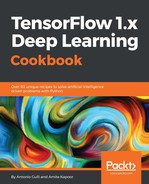We proceed with running distributed TensorFlow on Google CloudML:
- The first step is simply to download the example code
git clone https://github.com/GoogleCloudPlatform/cloudml-dist-mnist-example
cd cloudml-dist-mnist-example
- Then we download the data and save in a GCP storage bucket
PROJECT_ID=$(gcloud config list project --format "value(core.project)")
BUCKET="${PROJECT_ID}-ml"
gsutil mb -c regional -l us-central1 gs://${BUCKET}
./scripts/create_records.py
gsutil cp /tmp/data/train.tfrecords gs://${BUCKET}/data/
gsutil cp /tmp/data/test.tfrecords gs://${BUCKET}/data/
- Submitting a training job is a very easy: we can simply invoke the training step with CloudML engine. In this example, the trainer code runs for 1000 iterations in the region us-central1. The input data is taken from a storage bucket and the output bucket will be submitted to a different storage bucket.
JOB_NAME="job_$(date +%Y%m%d_%H%M%S)"
gcloud ml-engine jobs submit training ${JOB_NAME}
--package-path trainer
--module-name trainer.task
--staging-bucket gs://${BUCKET}
--job-dir gs://${BUCKET}/${JOB_NAME}
--runtime-version 1.2
--region us-central1
--config config/config.yaml
--
--data_dir gs://${BUCKET}/data
--output_dir gs://${BUCKET}/${JOB_NAME}
--train_steps 10000
- If you want You can control the training process by accessing the CloudML console in https://pantheon.google.com/mlengine/
- Once the training is concluded, it is possible to serve the model directly from CloudML
MODEL_NAME=MNIST
gcloud ml-engine models create --regions us-central1 ${MODEL_NAME}
VERSION_NAME=v1
ORIGIN=$(gsutil ls gs://${BUCKET}/${JOB_NAME}/export/Servo | tail -1)
gcloud ml-engine versions create
--origin ${ORIGIN}
--model ${MODEL_NAME}
${VERSION_NAME}
gcloud ml-engine versions set-default --model ${MODEL_NAME} ${VERSION_NAME}
- Once the model is served online it is possible to access the server and make a prediction. The request.json is created by using the script make_request.py which reads data from MNIST, performs a one hot encoding and then write the features with a well-formatted json schema.
gcloud ml-engine predict --model ${MODEL_NAME} --json-instances request.json
